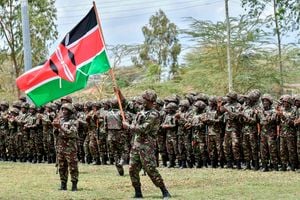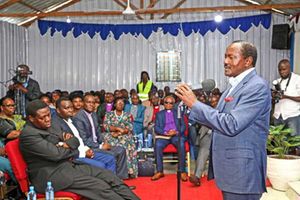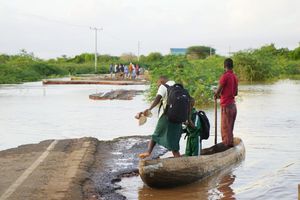Museveni wins even as he loses favour

President Yoweri Kaguta Museveni salutes his supporters at a past rally. Although President Museveni secured a big victory, his popular vote margin in several battleground districts was very thin. PHOTO | EUROPEAN PRESS AGENCY | DAILY MONITOR
What you need to know:
- There was delayed arrival of voting materials at polling stations especially in the populous Kampala and Wakiso districts, pockets of violence and reports of ballot stuffing in some parts of the country.
- The number of people who did not vote (5,575,460) is almost the same number as those who voted for Mr Museveni, highlighting the endemic problem of voter apathy in the country.
- With 35.37 per cent of the valid votes in the Thursday elections, it means that in spite of the fourth loss to the incumbent, his popularity increased by 9.37 per cent.
NAMBOOLE
After a tense campaign and a jumbled election, President Yoweri Kaguta Museveni was on Saturday declared winner of the February 18 presidential contest, which earned him a fifth elective term until 2021.
Although President Museveni, 71, secured a big victory, his popular vote margin in several battleground districts was very thin and results from 1,787 polling stations with 1,051,720 voters were left out of the tally.
Results from an election described by leaders of the main opposition party – the Forum for Democratic Change (FDC) as “a fraud” gave Mr Museveni 5,617,503 votes, representing 60.75 per cent of 9,246, 563 valid votes cast.
Dr Kizza Besigye, a four-time presidential contender and the FDC candidate, garnered 3,270,290 votes, representing 35.37 per cent of the valid votes cast.
Independent Go Forward candidate, John Patrick Amama Mbabazi came a distant third with 132,574 (1.4 per cent), Abed Bwanika of People’s Development Party obtained 86,075 (0.93 per cent), independent presidential candidate Venansius Baryamureeba got 51,086 (0.55 per cent) and Ms Maureen Waluube Kyalya (independent) secured 40,598 (0.44 per cent).
Maj Gen Benon Biraaro of Farmers Party of Uganda got 24,675 (0.2 per cent) and independent candidate Elton John Mabirizi raked in 23,762 (0.26 per cent).
Out of the 15,277,198 registered, only 9,701,738 took part in the exercise, representing 63.50 per cent.
This means that 5,575,460 voters either chose to stay home or were disenfranchised as a result of the irregularities that marred the elections.
There was delayed arrival of voting materials at polling stations especially in the populous Kampala and Wakiso districts, pockets of violence and reports of ballot stuffing in some parts of the country.
HUGE MARGIN
The valid votes were 9,246,563 and the invalid were 455,175, representing 4.69 per cent of the total votes cast.
The number of people who did not vote (5,575,460) is almost the same number as those who voted for Mr Museveni, highlighting the endemic problem of voter apathy in the country.
In the 2011 elections, 5.6 million registered voters did not turn up to vote, representing a higher figure than the 5.4 million voters who voted President Museveni for a fourth elective term.
In the past four elections, voter turnout has been decreasing from 72 per cent in 1996 to 69.7 per cent in 2001, 69.2 per cent in 2006 before hitting a record low in 2011 with 57.1 per cent, according to figures computed by the Electoral Commission (EC).
Explaining why some results from 1,787 polling stations were not tallied, Mr Kiggundu said: “Even if all the untallied results were added to the second candidate [Dr Kizza Besigye] the leading candidate will still get more than 50 per cent and this is provided for in the law.”
Mr Museveni’s win sets him on course to lead Uganda for a cumulative 35 years since 1986.
With 60.75 per cent of the valid votes, his popularity has dropped from 68.38 per cent in 2011.
Dr Besigye, who had the backing of Inter-Party Cooperation (IPC) flag, a loose coalition of opposition parties in 2011, obtained 2,064, 963 (representing 26 per cent) votes then.
IMPROVEMENT
With 35.37 per cent of the valid votes in the Thursday elections, it means that in spite of the fourth loss to the incumbent, his popularity increased by 9.37 per cent.
This is the second best result for Dr Besigye since 2006 elections when he scored 37 per cent.
Describing Uganda as “a young democracy”, Mr Badru Kiggundu, the Electoral Commission chairperson, appealed for tolerance in his farewell message and asked international observers to handle Uganda with kid gloves.
“We are serving our last term as a commission and we are proud for having served you for 14 years because it’s the law. It’s a thankless service with a lot of criticism... the output of an election can either tear or build a country.”
Mr Kiggundu promised to improve on the black spots in the electoral process, adding that “there is no country in the world that conducts an error-free election” before announcing that “….Yoweri Museveni who has obtained the highest number of votes in the election and the votes cast in his favour being more than 50 per cent of the valid votes cast at the presidential elections” was the winner of the contest.
As the Electoral Commission tallied votes from across the country on Saturday, the FDC party issued a statement rejecting the results, citing what they called “unacceptable fraud”.
In a press release sent to different media houses, the FDC president, Maj Gen (Rtd) Mugisha Muntu, called upon all Ugandans and the international community to “reject and condemn the fraud that has been committed and to expose it to the fullest extent possible.”






